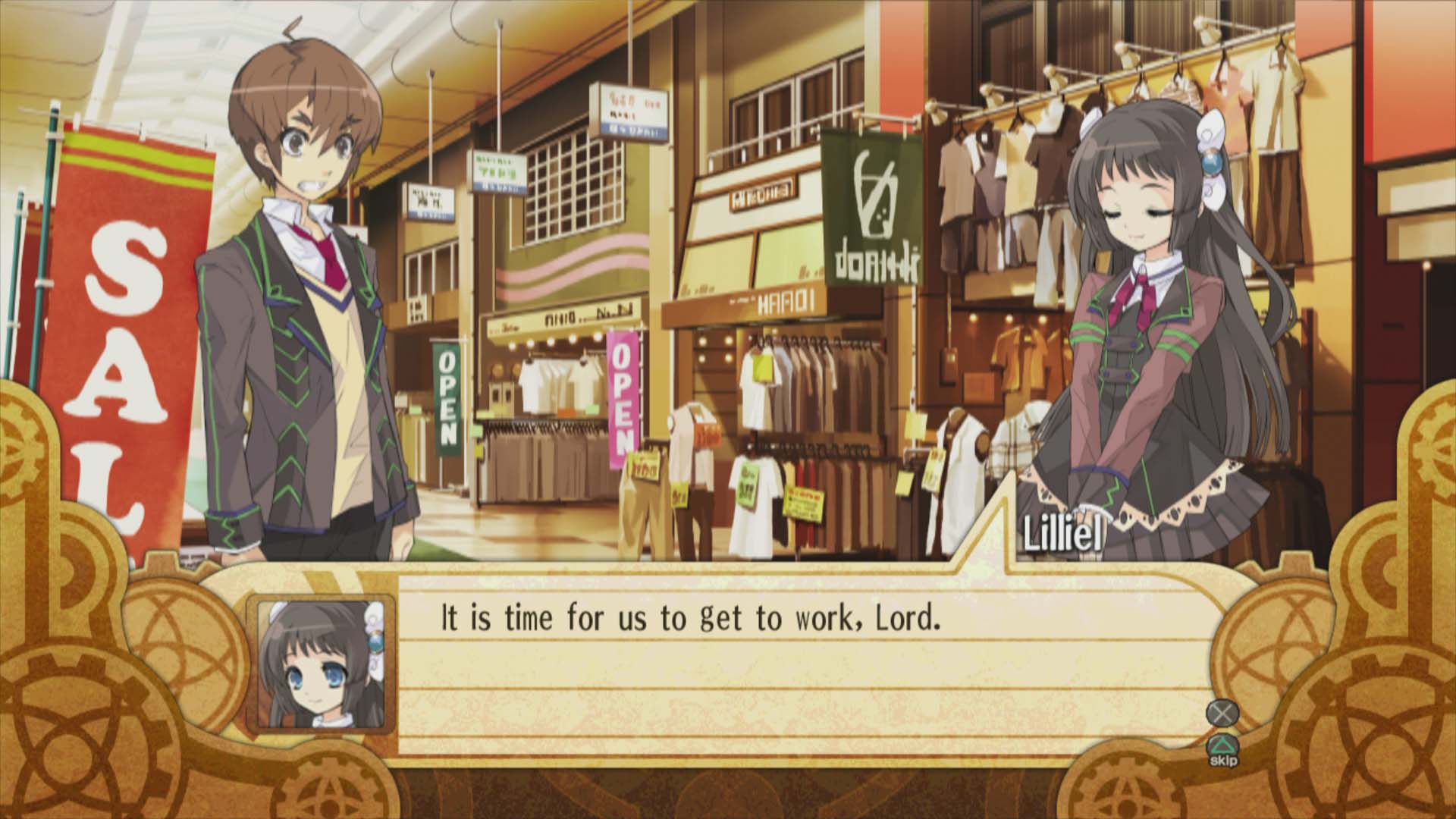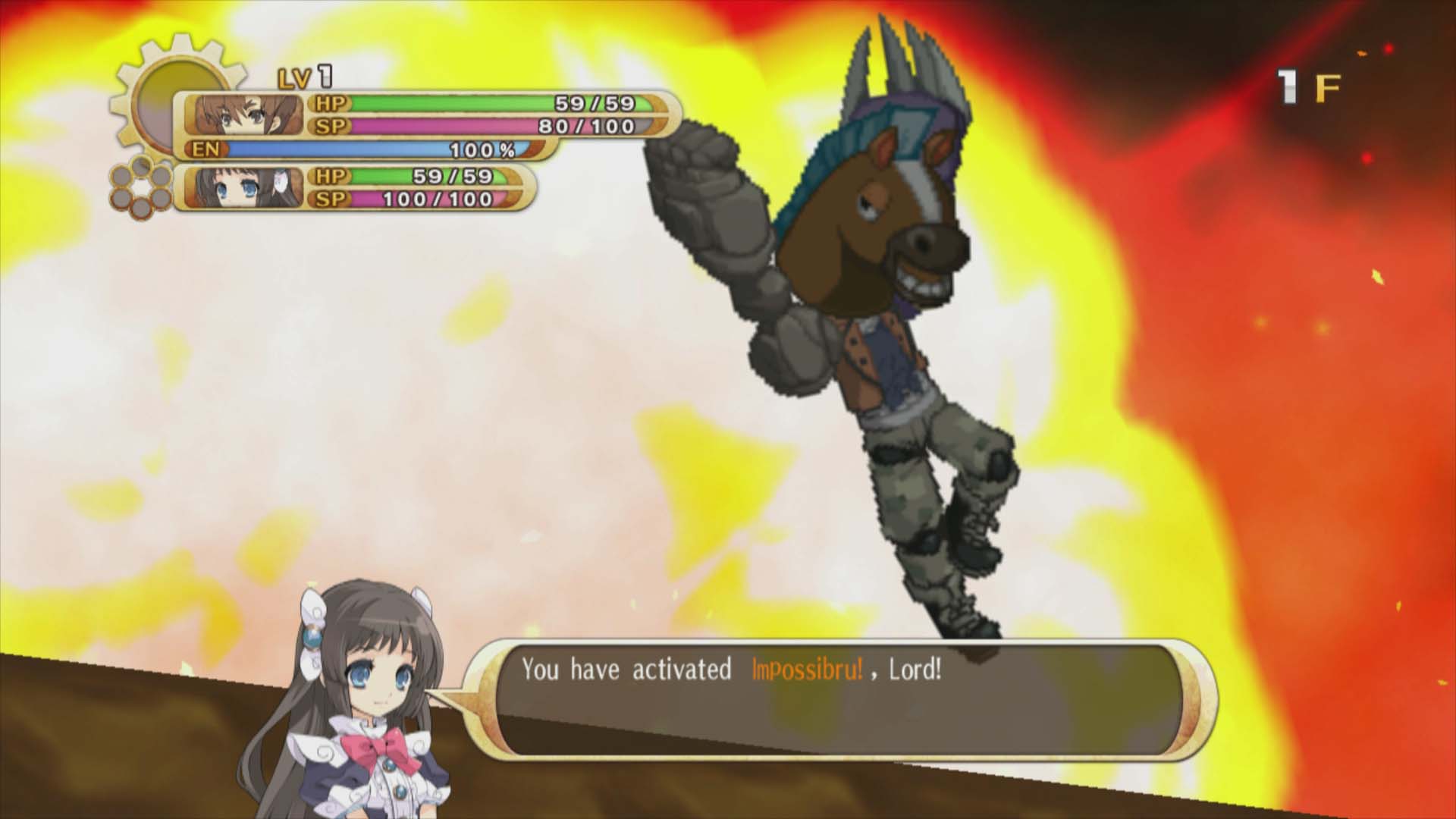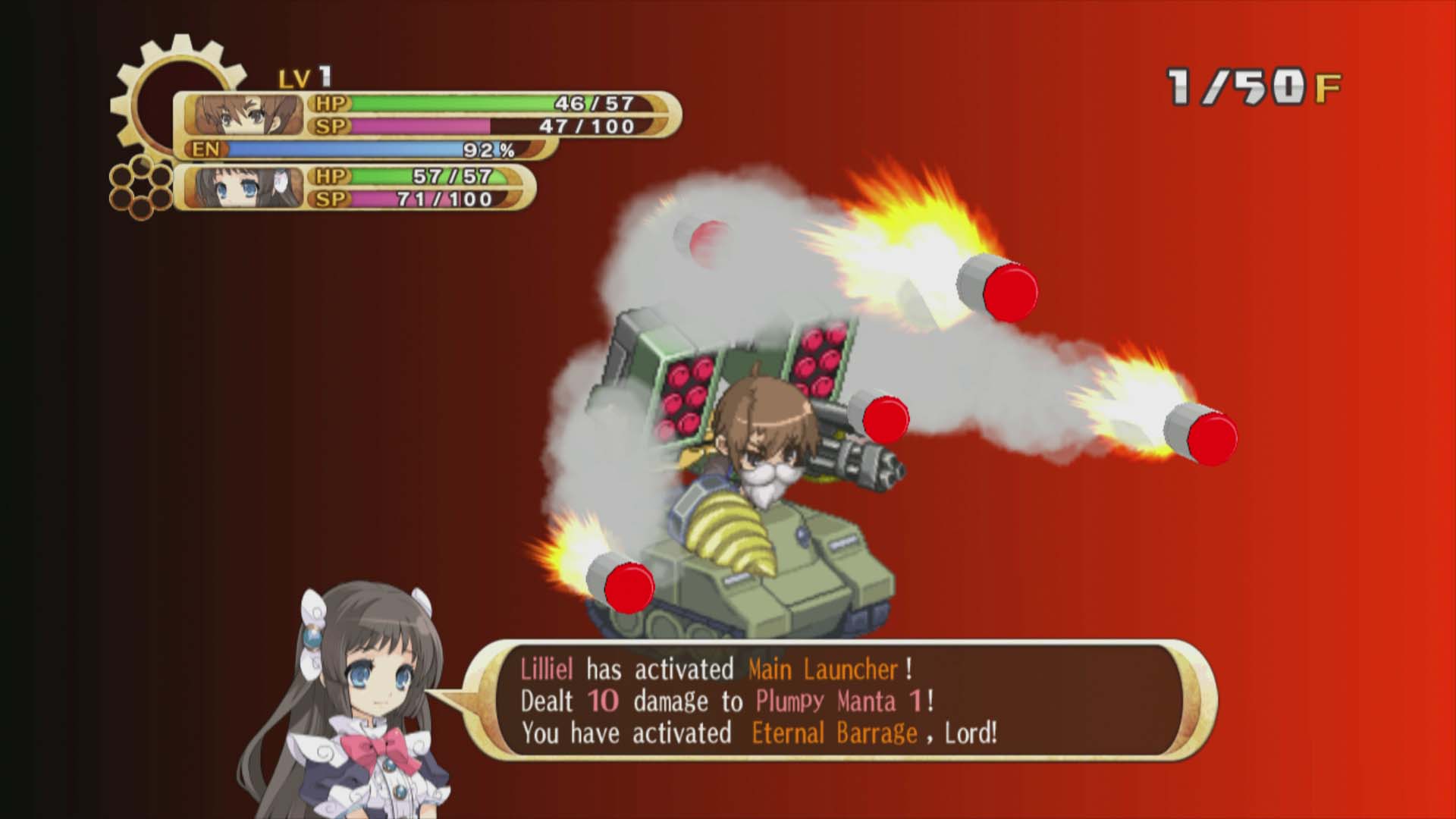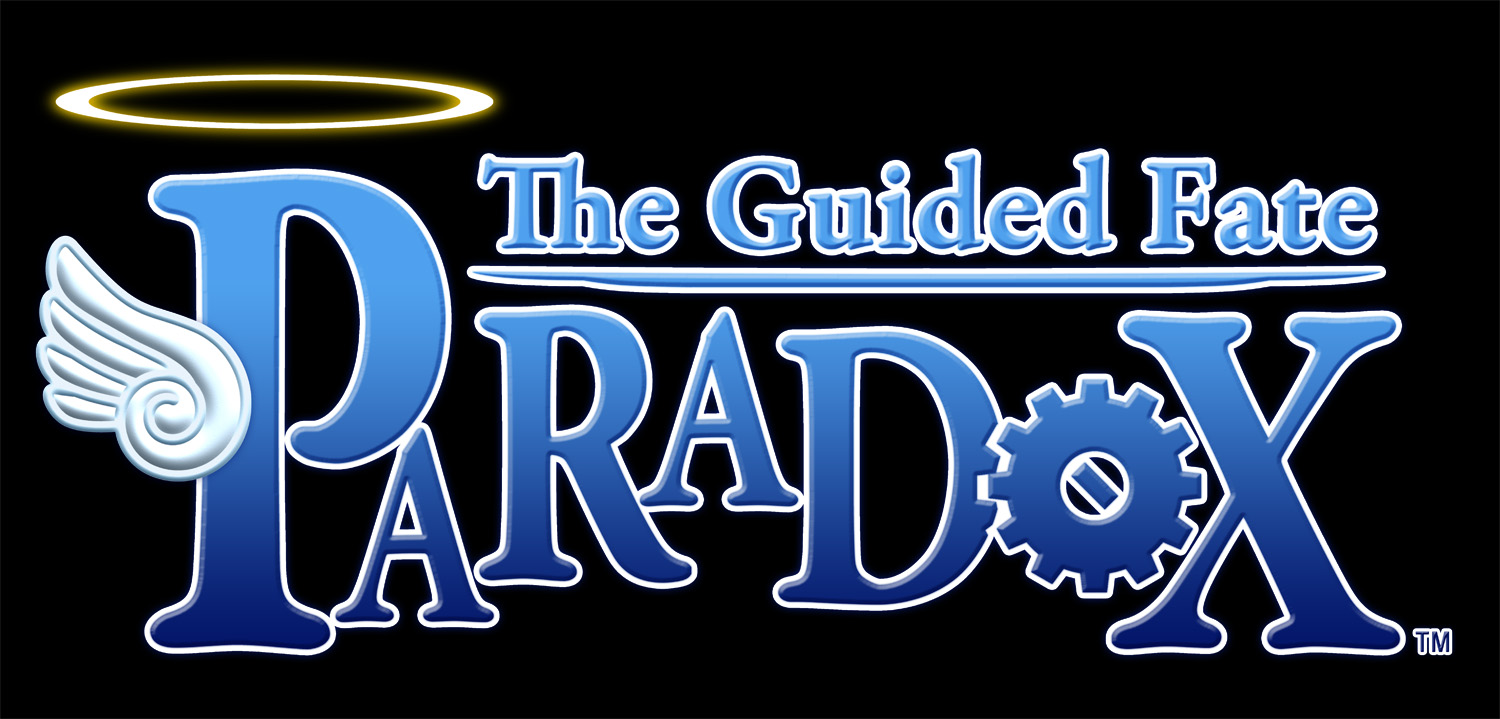The Guided Fate Paradox is a game developed by Nippon Ichi Software, famous for their Disgaea series, and is set to bring the divine into gaming, placing you into God’s shoes. Though unlike the pretence of God you won’t be sitting on a giant throne made of gold and waving you hand to grant wishes and mould the world, no, you will be delving into dungeons to defeat demons-I mean aberrations. I guess it’s time to guide this review to a Revolution!
Story
The game starts off with a little backstory for our would-be-hero, Renya Kagurazaka, a High School student with terrible luck when it comes to lotteries. We are given an in-game cutscene where Renya is passing by in a mall and happens upon a cute girl in a maid outfit who is energetically calling out to people to give her lottery a spin. After several attempts at refusal Renya is forced to spin the lucky wheel and when he stops spinning a golden ball drops out of the machine… Lucky much.
 After winning the lottery Renya is killed… I mean knocked unconscious with a huge pan, and is taken to Celestia, this game’s version of Heaven. After arriving, Renya is told that he is the new God of earth, space and all dimensions within them, much to his disbelief. The girl who brought you here, who is named Lilliel, tells Renya that she is an angel and sprouts wings and a halo to prove her tale. Renya is soon introduced to the rest of the Angelic team who resides on Celestia.
After winning the lottery Renya is killed… I mean knocked unconscious with a huge pan, and is taken to Celestia, this game’s version of Heaven. After arriving, Renya is told that he is the new God of earth, space and all dimensions within them, much to his disbelief. The girl who brought you here, who is named Lilliel, tells Renya that she is an angel and sprouts wings and a halo to prove her tale. Renya is soon introduced to the rest of the Angelic team who resides on Celestia.
After introductions have been made Lilliel tells Renya of his main task as God, to grant wishes to any whom pray to him, this task would be impossible however without the Fate Revolution Circuit, a machine that collects all the wishes in existence and sorts them according to difficulty. To grant these wishes Renya must go inside the Circuit and travel through a construction of data that formulates into “Dungeons” of varying aesthetics, ranging from castles, volcanoes and water worlds. Through the Circuit Renya must defeat aberrations that form from the minds of the person whose wish you are trying to grant, as well as reach the end to fight the boss of the “dungeon”.
You begin to grant wishes, granting the wish of Cinderella, who wishes for a more believable and realistic end to her fairy tale, as well an aiding a Zombie to become a better brain eater and to toughen up. The wishes themselves are not too critical to the story as they are more of a background feature to what the dungeon is about. After a few chapters you are introduced to the real threat and goal of the game, defeat the Devils and Demons.
 The main goal of the game is to grant wishes and become strong enough to defeat Satanael, the “god” of the Devils who is bent on doing what he pleases to sate his boredom, either reading books or razing villages to “kill some time”.
The main goal of the game is to grant wishes and become strong enough to defeat Satanael, the “god” of the Devils who is bent on doing what he pleases to sate his boredom, either reading books or razing villages to “kill some time”.
Whilst the story is constantly and consistently revealed and told to us, it can get a bit repetitive and annoying, as when you go through a dungeon for the first time whenever you complete a level you are given a 5 to 10 minute long in-game cutscene to tell us what is happening in the world. When “Dungeons” last up to around 10 levels it can become a regular nuisance to have to sit through an almost pointless cutscene before moving on ahead. This annoyance is readily fixed however, with the ability to skip almost every scene in the game, or to fast forward through them at a press of a button.
This game is definitely lengthy, with each dungeon taking a couple hours each to complete, on top of all the upgrading, exploring and grinding required to be able to beat the difficulty curve found in later chapters.
Gameplay
From first play, you will draw a lot of comparisons to this game in its dungeon crawling part of the game, the most common game I’ve seen likened to this one is Pokémon dungeon, but I would also say it is similar to Disgaea and Recettear: An Item Shop’s Tale. You play on a grid system and must travel across a level to find the teleporter to advance to the next level of the “dungeon”, defeating monsters and collecting items along the way, all the while in a birds eye/third person view.
 The way you level up in the game is a system that is rarely seen in games, where you level up inside of the dungeon and those levels are added to a total level at the end that stays with you for the entire game. There are two separate levelling system in play here, Total level increases your base stats which in turn affects how your Dungeon-Level strengthens you, the Dungeon-Level is reset each time you enter a new Dungeon, so grinding has bit more strategy to it.
The way you level up in the game is a system that is rarely seen in games, where you level up inside of the dungeon and those levels are added to a total level at the end that stays with you for the entire game. There are two separate levelling system in play here, Total level increases your base stats which in turn affects how your Dungeon-Level strengthens you, the Dungeon-Level is reset each time you enter a new Dungeon, so grinding has bit more strategy to it.
Other than levelling up you also have to improve your equipment which comes in the forms of Head, A1 (weapon), A2, Leg and Misc. Gear. Besides swapping out for different and more powerful equipment you can also burst your items to allow you to strengthen them at a blacksmith to increase their base stats. Bursting is one of the main mechanics of the game and one you will focus on the most during your grinding sessions, it is done simple by having the item equipped and fighting with them.
Along with levelling and equipment you also collect Holy Icons, which you obtain from bursting equipment, which you place onto the Divinigram, which is very similar to levelling on a sphere grid or like the level system in Tales Of Xillia. In the Divinigram you place Holy Icons to improve your Attack, Defence, Speed and Hit stats, as well as Holy Artifacts that give bonuses to certain equipment or enlarging your backpack size.
All of the ways to improve your characters can amount to extreme customization, allowing you to specialize exclusively into Attack damage or even out all your stats for a Jack of all trades. Whatever you choose to do, you will definitely see the impact your effort brings. Unless you die… then you lose all your items, which is a real pain when you lose an úber powerful weapon, though this can be combated later on when you can create Divine item sets that you can summon into the dungeons.
Overall Thoughts and Feelings
The music within The Guided Fate Paradox is without a doubt not background noise, with exemplary songs like the title screen song and boss battle music. Ranging from heavenly choir voices, to rock tracks and J-Pop singles. The music really compliments the game and its atmosphere, with dark brooding music for Demons and upbeat and happy music for the Angels. The music is full of energy and you will definitely love the majority of the soundtrack you hear during your Dungeon crawls.
 The voice acting is where this game fails heavily, the only voices I could stand were that of the main character Renya and a couple of the male voice actors. The majority of the female voices are too cringe worthy and make me want to throw down my God Title and kill them all. Besides the “child” characters, the other females are just irritating in how much their force their character in their voice. It is either my own preference, but I was sorely disappointed whenever a new character was introduced, just by hearing their voice.
The voice acting is where this game fails heavily, the only voices I could stand were that of the main character Renya and a couple of the male voice actors. The majority of the female voices are too cringe worthy and make me want to throw down my God Title and kill them all. Besides the “child” characters, the other females are just irritating in how much their force their character in their voice. It is either my own preference, but I was sorely disappointed whenever a new character was introduced, just by hearing their voice.
Another failing in the game is the difficulty curve found within switching between chapters as you will find yourself helpless outmatched towards the end of a dungeon without much warning. The beginning of the game can feel a bit of a push over, but getting to around the 3rd or 4th chapter, I was at the final boss and was set against an insurmountable amount of aberrations to defeat and I was sorely not prepared for them. The difficulty can be a bit annoying at times, as after grinding you can feel too overpowered to feel any threat from enemies, going from one extreme to another.
What I love about this game is the amount of customization and mechanics it fits into it, with 2 levelling systems, a in depth weapon strengthening system, item fusing, Divinigram stat boosts, special attacks and more. You can really make the characters your own, even if it does take a lot of hard work and planning to do so.
I give The Guided Fate Paradox a 3/5, it can be a very fun game at times but with the amount of forced story, the endless grinding sessions and repetitive upgrading systems the immersion is just pulled straight out. The voices really grind your gears, as they can make the people who you are trying to save not worth saving at times. Fans of customization and anime style games will love Paradox, but people looking for a straightforward romp through dungeons might be disappointed.
Disclaimer:All scores given within our reviews are based on the artist’s personal opinion; this should in no way impede your decision to purchase the game.









You must be logged in to post a comment.